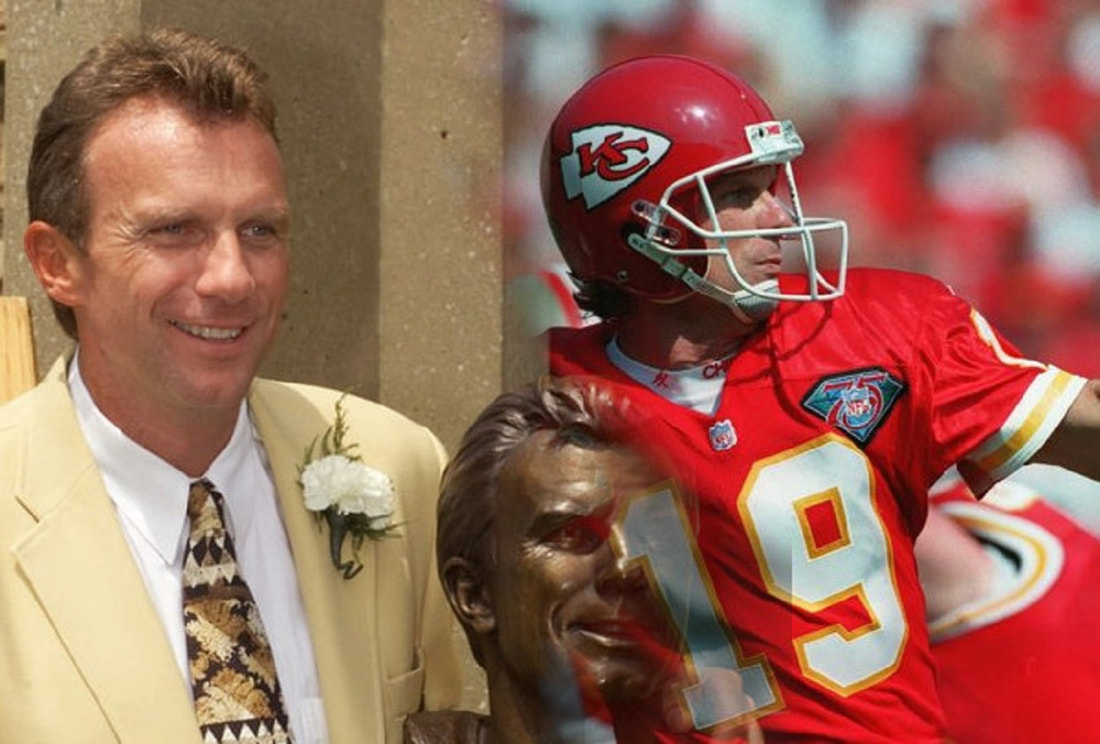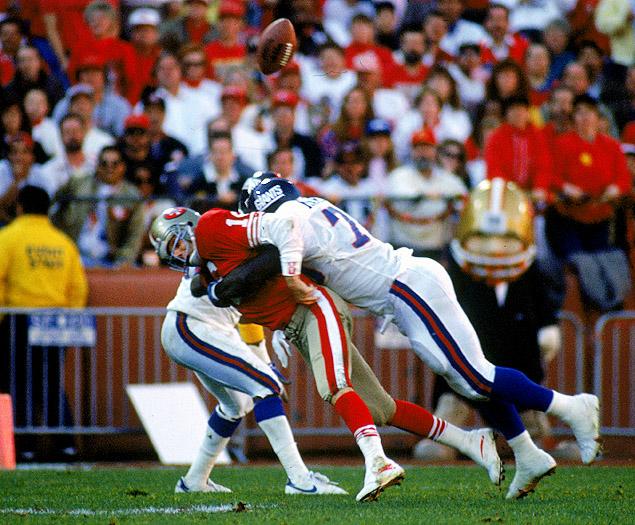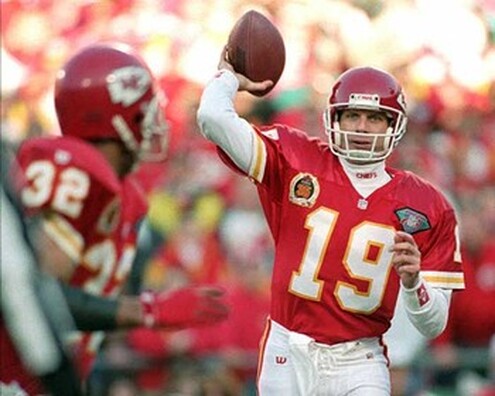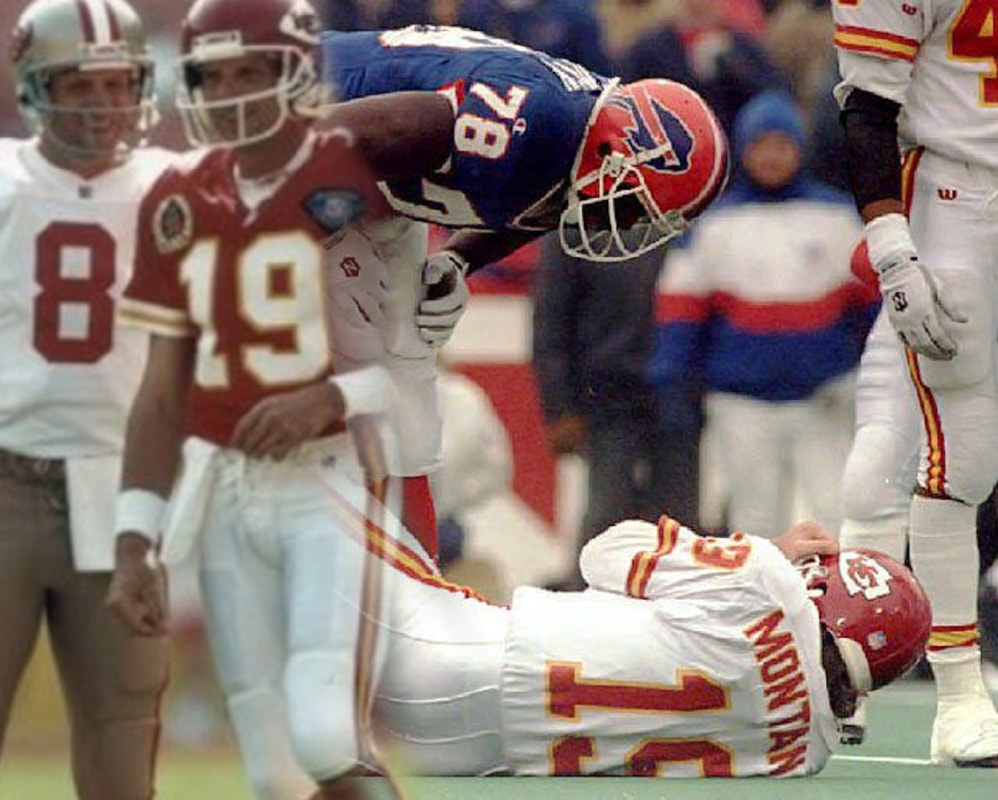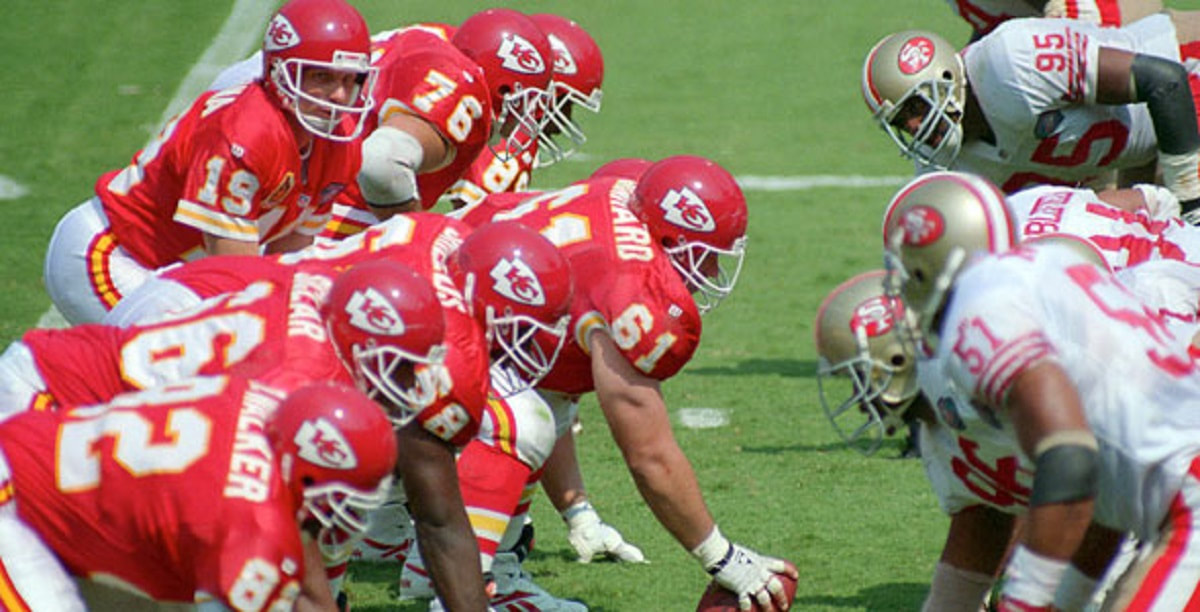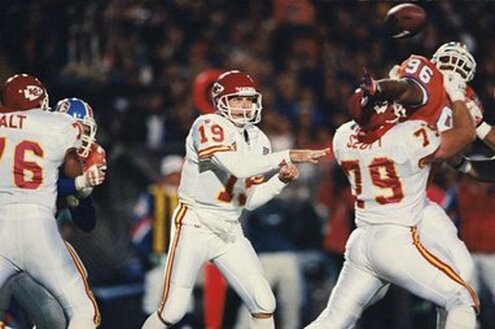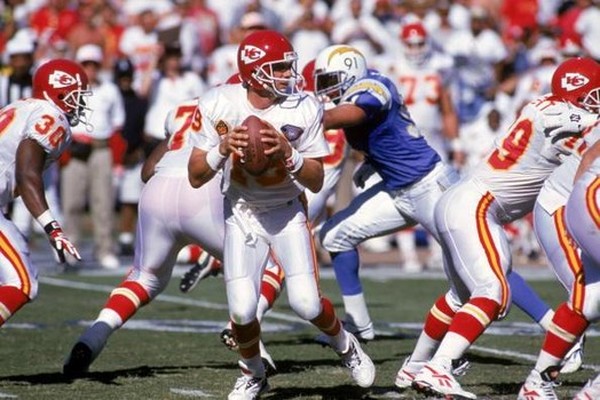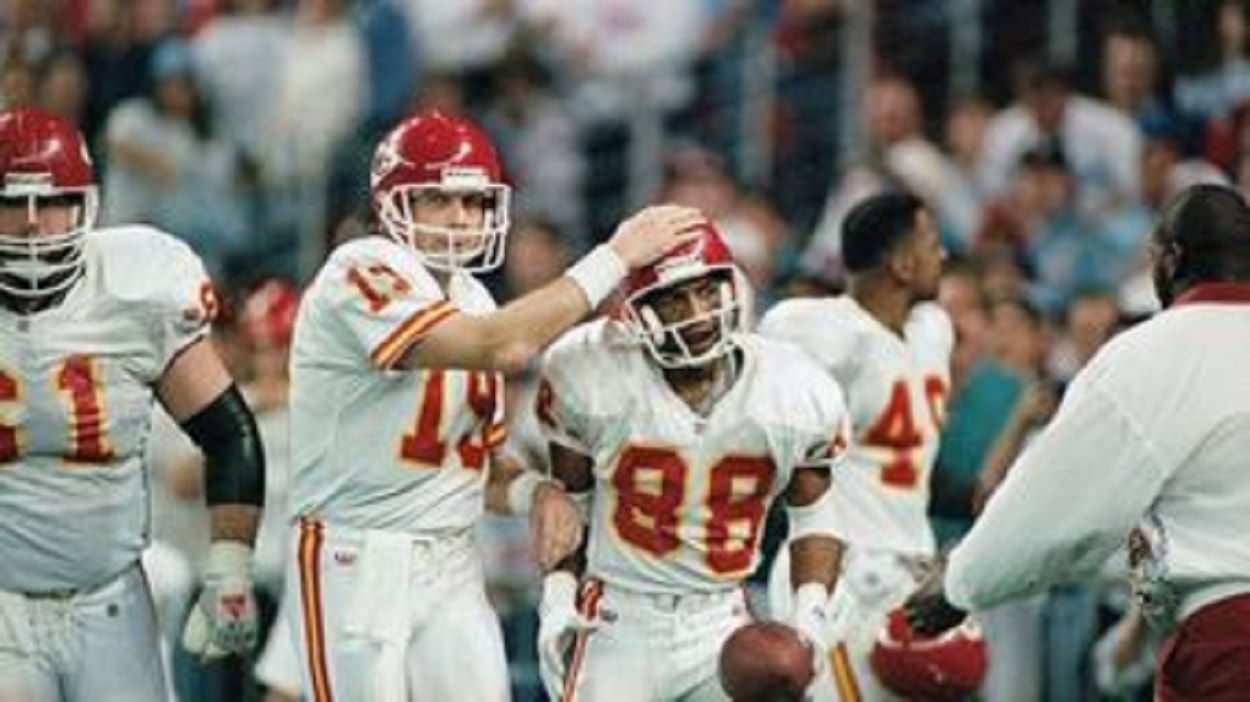Kansas City Joe – Montana’s Quest For A Fifth Ring, And A Swansong Of Classic Quarterback Duels
There was a time when the idea of Joe "Cool" Montana leaving San Francisco before he was ready to actually stop playing football altogether was unheard of. However despite coming off back-to-back Super Bowl winning seasons, an injury suffered in the 1990 NFC Championship game while in search of a third straight title would not only put Montana out of any meaningful football for the next two seasons, it would ultimately put him out of the 49ers franchise and on his way to Kansas City where he would play his final two NFL seasons with the Chiefs.
He had successfully seen off fellow signal caller, Steve Young, during the 1988 season, eventually re-solidifying his place as the team’s starting quarterback with a late season stretch that saw the 49ers win five of their last six games to claim the NFC West, destroy two very worthy playoff opponents in the Vikings (34-9) and the Bears (28-3) before leading his team on one of the greatest game winning drives in NFL history in Super Bowl XXIII to claim the 49ers’ third championship with a 20-16 victory over the Cincinnati Bengals.
The following year Montana led San Francisco to a 14-2 regular season record where they again hammered the Vikings (41-13) and then the Rams (30-3) in the NFC playoffs before dismantling the Denver Broncos 55-10 in the most lop-sided Super Bowl ever played. Montana of course was the Super Bowl MVP, for the third time no less.
So as "Joe Cool" led the 49ers to another 14-2 regular season record in 1990, after casting aside Washington (28-10) in the divisional round they welcomed the New York Giants to Candlestick Park for the 1990 NFC Championship game. And it seemed Joe would be going nowhere anytime soon.
The contest was a rematch of a bruising, hard hitting Monday night contest from two months earlier when the 49ers held on to take the win 7-3 in what was at the time the lowest scoring Monday Night Football game ever. Now they were looking for a trip to their third straight Super Bowl where a victory would mean they would be the first NFL team to “three-peat.” However, the contest would be Joe Montana’s last meaningful game wearing the 49ers’ red-and-gold. Much like the Monday night game back in week thirteen, this contest was low scoring throughout, with San Francisco scoring the only touchdown and clinging to a 13-9 lead late in the fourth period.
Montana never saw the hit that shifted from his throne.
Leonard Marshall laid the bruising blow on the legendary quarterback, jarring the ball loose in the process (although it was recovered by the 49ers). Montana did not appear seriously injured at first, although he was obviously disorientated. Dropping back to pass as normal, Montana had seen that all of his receivers were covered down the field. As he sensed his pass protection breaking down he vacated the pocket. At this point in the play, Marshall was actually picking himself up off the ground after his initial pass rush had resulted in him being forced to the turf. Montana rolled out to his right, avoided a potential hit by Giants’ legendary linebacker, Lawrence Taylor, and prepared to throw.
However, in having escaped Taylor he had put himself directly in the path of lineman, Marshall, who now, back to his feet, drilled the quarterback before he could release the pigskin. NBC commentator Pat Summerall stated on air several minutes later as Montana sat looking glazed on the 49ers’ bench “The doctors want him (Montana) to stay where he is because the report his, everything hurts!”
The following year Montana led San Francisco to a 14-2 regular season record where they again hammered the Vikings (41-13) and then the Rams (30-3) in the NFC playoffs before dismantling the Denver Broncos 55-10 in the most lop-sided Super Bowl ever played. Montana of course was the Super Bowl MVP, for the third time no less.
So as "Joe Cool" led the 49ers to another 14-2 regular season record in 1990, after casting aside Washington (28-10) in the divisional round they welcomed the New York Giants to Candlestick Park for the 1990 NFC Championship game. And it seemed Joe would be going nowhere anytime soon.
The contest was a rematch of a bruising, hard hitting Monday night contest from two months earlier when the 49ers held on to take the win 7-3 in what was at the time the lowest scoring Monday Night Football game ever. Now they were looking for a trip to their third straight Super Bowl where a victory would mean they would be the first NFL team to “three-peat.” However, the contest would be Joe Montana’s last meaningful game wearing the 49ers’ red-and-gold. Much like the Monday night game back in week thirteen, this contest was low scoring throughout, with San Francisco scoring the only touchdown and clinging to a 13-9 lead late in the fourth period.
Montana never saw the hit that shifted from his throne.
Leonard Marshall laid the bruising blow on the legendary quarterback, jarring the ball loose in the process (although it was recovered by the 49ers). Montana did not appear seriously injured at first, although he was obviously disorientated. Dropping back to pass as normal, Montana had seen that all of his receivers were covered down the field. As he sensed his pass protection breaking down he vacated the pocket. At this point in the play, Marshall was actually picking himself up off the ground after his initial pass rush had resulted in him being forced to the turf. Montana rolled out to his right, avoided a potential hit by Giants’ legendary linebacker, Lawrence Taylor, and prepared to throw.
However, in having escaped Taylor he had put himself directly in the path of lineman, Marshall, who now, back to his feet, drilled the quarterback before he could release the pigskin. NBC commentator Pat Summerall stated on air several minutes later as Montana sat looking glazed on the 49ers’ bench “The doctors want him (Montana) to stay where he is because the report his, everything hurts!”
Channel 4’s own endzone camera shot of Montana’s injury was legendary in itself, and was shot from the back of the endzone furthest from the action, approximately seventy-five yards away from the play, and is a ‘classic’ clear look at the action developing. You can check out that hit here.
Steve Young came into the game, but the Giants managed to orchestrate two field goal drives in the game’s final minutes and snatch the contest from San Francisco’s grasp, 15-13. While Montana was still with the 49ers throughout the 1991 and 1992 seasons, he was still recovering from various injuries that allowed Steve Young to take control of the team.
Montana did play the second half of a meaningless game in the 1992 regular season finale against the Detroit Lions on Monday Night Football, but by the this time the writing was more than on the wall and it was seen by most as a “thank you” of sorts to Joe, and a way for the one-time Bay Area legend to show any potential teams that he still had what it took to take a team to the big game. When the playoffs started that year, Montana was on the bench as Young took the team to the NFC Championship where they lost to the Cowboys 30-20 on a muddy Candlestick field.
By the start of the 1993 season, Montana, along with another former Super Bowl MVP free agent signing, former Raiders’ running back, Marcus Allen, were now Chiefs in Kansas City, playing for Marty Schottenheimer, and along with Derrick Thomas and Neil Smith on the defensive side of the ball, they were going to take the Chiefs to the Super Bowl, with each of them showing their former employers that they were wrong to trade them in the process.
Steve Young came into the game, but the Giants managed to orchestrate two field goal drives in the game’s final minutes and snatch the contest from San Francisco’s grasp, 15-13. While Montana was still with the 49ers throughout the 1991 and 1992 seasons, he was still recovering from various injuries that allowed Steve Young to take control of the team.
Montana did play the second half of a meaningless game in the 1992 regular season finale against the Detroit Lions on Monday Night Football, but by the this time the writing was more than on the wall and it was seen by most as a “thank you” of sorts to Joe, and a way for the one-time Bay Area legend to show any potential teams that he still had what it took to take a team to the big game. When the playoffs started that year, Montana was on the bench as Young took the team to the NFC Championship where they lost to the Cowboys 30-20 on a muddy Candlestick field.
By the start of the 1993 season, Montana, along with another former Super Bowl MVP free agent signing, former Raiders’ running back, Marcus Allen, were now Chiefs in Kansas City, playing for Marty Schottenheimer, and along with Derrick Thomas and Neil Smith on the defensive side of the ball, they were going to take the Chiefs to the Super Bowl, with each of them showing their former employers that they were wrong to trade them in the process.
From The West Coast To The Mid-West!
Not only did the Chiefs bring Montana to Kansas City, they brought his entire “offense” opting to teach the new offense to the entire team rather than have Montana learn the Chiefs offense. Montana’s offense was quarterback friendly – you get the ball out of your hands and into the hands of your receivers and playmakers.
One of Montana’s eventual playmakers in Kansas City turned out to be J.J. Birden. However, initially Birden was in awe of “Cool Joe” – so much so that it led to his first lesson from the legendary field general. He would recall:
One of Montana’s eventual playmakers in Kansas City turned out to be J.J. Birden. However, initially Birden was in awe of “Cool Joe” – so much so that it led to his first lesson from the legendary field general. He would recall:
“I can recall the very first play we called in practice was X-hook. I ran a hook and Joe hit me in the back of the helmet (with the ball), and I came back to the huddle and he says ‘OK, now I did that for a reason. You gotta understand, I don’t wait until you get open. I expect you to be in an area, and I throw it anticipating that, so you want to get used to getting your head around faster!’ And that was the first lesson I got from Joe!”
The Joe Montana–era started officially in Kansas City with a 27-3 victory over the Tampa Bay Buccaneers in the opening game of the season, but when he missed the following game as a result of an injury picked up in the season opener, the Chiefs were routed 30-0 at the hands of the Houston Oilers. Montana returned to the line-up and the Chiefs reeled off four consecutive victories restoring a little of the faith of the Kansas City sports media and fans alike.
Although Montana did miss considerable time throughout the regular season he still made the AFC Pro Bowl roster, and his presence also helped even when he wasn’t on the field. He was close with back-up quarterback Dave Krieg (who had taken every single snap for the Chiefs the year before), and his down-to-earth personality made him a great teammate in general.
Despite splitting their last two games of the campaign in what appeared to be a "slump" of sorts, the Chiefs ended the 1993 season as AFC West champions with an 11-5 record, and now with Montana, bruised but healthy, their playoff run would begin. This is what they brought “Cool Joe” to the mid-west for.
In the wild card round the Chiefs welcomed the Pittsburgh Steelers to a cold Arrowhead Stadium. After three quarters had been played the Steelers were clinging to a seven point lead, 17-10. Montana then began to go to work as he led the Chiefs from behind to send the game into overtime where Kansas City stole the win 27-24.
Elements of the “vintage” Joe Montana were on display again the following week in the Astrodome in Houston as he faced the revamped and even nastier Oilers’ defense, now under the command of one Buddy Ryan. The Oilers also entered the game winners of eleven straight games after beginning the year in meltdown on their way to a 1-4 start. Joe Montana or no Joe Montana, Houston and their own rejuvenated star quarterback Warren Moon were considered the favorite.
After the home team took a 10-0 lead into the locker-room at the half, Montana began to work his magic in the third period as he fired a touchdown pass to tight-end, Keith Cash, pulling the score to within three points. After Houston booted through a field goal early in the fourth quarter, “Cool Joe” led the Chiefs down the field once again, cutting through the Oilers defense and the noise of the encased crowd, eventually hitting J.J. Birden from 11 yards out to take the lead for the first time in the contest, 14-13. Following a recovered fumble by the Chiefs defense, Montana quickly found Willie Davis from eighteen yards out and a 21-13 lead.
The Oilers did pull to within one point on their next drive, but Montana again led his Chiefs down the field, in complete control and taking valuable time off the clock on a 79-yard drive that ended with a 21-yard touchdown run from the team’s other free agent signing, Marcus Allen. The game ended 28-20, and the Chiefs were on their way to the AFC Championship Game where they would face the Buffalo Bills in the freezing cold of Rich Stadium.
With Steve Young preparing to lead the 49ers against the Cowboys in the NFC’s equivalent game later that afternoon, many were licking their lips at the genuine possibility of a Joe Montana verses Steve Young Super Bowl. The pre-game stories would surely write themselves. Although the score was 20-6 in the Bills favor at half-time, the Chiefs entered the locker room relatively up-beat. They weren’t playing particularly bad and they had Joe Montana. He would pull something out in the second half. They were going to the Super Bowl, right? Less than a minute into the third period, however, it all came crashing down, as did three Bills players on to “Joe Cool” for the sack.
Montana said of the sack years later:
Although Montana did miss considerable time throughout the regular season he still made the AFC Pro Bowl roster, and his presence also helped even when he wasn’t on the field. He was close with back-up quarterback Dave Krieg (who had taken every single snap for the Chiefs the year before), and his down-to-earth personality made him a great teammate in general.
Despite splitting their last two games of the campaign in what appeared to be a "slump" of sorts, the Chiefs ended the 1993 season as AFC West champions with an 11-5 record, and now with Montana, bruised but healthy, their playoff run would begin. This is what they brought “Cool Joe” to the mid-west for.
In the wild card round the Chiefs welcomed the Pittsburgh Steelers to a cold Arrowhead Stadium. After three quarters had been played the Steelers were clinging to a seven point lead, 17-10. Montana then began to go to work as he led the Chiefs from behind to send the game into overtime where Kansas City stole the win 27-24.
Elements of the “vintage” Joe Montana were on display again the following week in the Astrodome in Houston as he faced the revamped and even nastier Oilers’ defense, now under the command of one Buddy Ryan. The Oilers also entered the game winners of eleven straight games after beginning the year in meltdown on their way to a 1-4 start. Joe Montana or no Joe Montana, Houston and their own rejuvenated star quarterback Warren Moon were considered the favorite.
After the home team took a 10-0 lead into the locker-room at the half, Montana began to work his magic in the third period as he fired a touchdown pass to tight-end, Keith Cash, pulling the score to within three points. After Houston booted through a field goal early in the fourth quarter, “Cool Joe” led the Chiefs down the field once again, cutting through the Oilers defense and the noise of the encased crowd, eventually hitting J.J. Birden from 11 yards out to take the lead for the first time in the contest, 14-13. Following a recovered fumble by the Chiefs defense, Montana quickly found Willie Davis from eighteen yards out and a 21-13 lead.
The Oilers did pull to within one point on their next drive, but Montana again led his Chiefs down the field, in complete control and taking valuable time off the clock on a 79-yard drive that ended with a 21-yard touchdown run from the team’s other free agent signing, Marcus Allen. The game ended 28-20, and the Chiefs were on their way to the AFC Championship Game where they would face the Buffalo Bills in the freezing cold of Rich Stadium.
With Steve Young preparing to lead the 49ers against the Cowboys in the NFC’s equivalent game later that afternoon, many were licking their lips at the genuine possibility of a Joe Montana verses Steve Young Super Bowl. The pre-game stories would surely write themselves. Although the score was 20-6 in the Bills favor at half-time, the Chiefs entered the locker room relatively up-beat. They weren’t playing particularly bad and they had Joe Montana. He would pull something out in the second half. They were going to the Super Bowl, right? Less than a minute into the third period, however, it all came crashing down, as did three Bills players on to “Joe Cool” for the sack.
Montana said of the sack years later:
“As soon as I landed, everything went white. I had a severe pain in my head!”
"I Really Want This One!"
In the book Best Of Rivals, former Kansas City teammate Tim Grunhard stated:
“There’s pros and cons to having a quarterback like Joe Montana. The pros are that you believed that If he was in the huddle you had every opportunity to win. But the con is, when you lose a guy like that, I think you lose confidence and you lose the inate idea that ‘we can win this game if Joe’s in here, but if Joe’s not here, gosh, can we still win?’ And it put a little doubt in our minds.”
As his team-mates came over to see if he was OK on the side-line as the second half progressed, they noticed that he looked “different”, “older”, “beat up” and “tired.” Although back-up quarterback, Dave Krieg, did lead the Chiefs down the field to their only touchdown of the game on a 1-yard plunge from Marcus Allen, the Chiefs were emotionally as concussed as their offensive leader and went on to lose 30-13.
The following season though started very promisingly. Following an opening day 30-17 victory over the New Orleans Saints, the much anticipated and hoped for match-up of Montana verses Steve Young did happen as the Chiefs welcomed the 49ers to Arrowhead Stadium. The week earlier Young had thrown the touchdown passes that had edged Jerry Rice towards the all-time touchdown record, on Monday Night Football to boot. It is highly likely Montana witnessed the contest, and as much as he would have been genuinely pleased for his former favorite target, he must have felt a little, that it should have been him throwing those touchdown passes. Now was Montana’s chance to prove he was still “the man”, not only to Young, but to the 49ers organisation that picked Young over him.
The weather was hot in Kansas City, but due to the Arrowhead Stadium now boasting a natural grass field instead of the astroturf surface of previous seasons, the conditions were not nearly as stifling as they might have been. And as it would turn out for Young, it would be better to take the beating that was in store on a natural grass surface than a thinly carpeted concrete field, which essentially is what astroturf is.
Montana came out and promptly led the Chiefs down the field scoring on a pass to eligible tackle, Joe Valereo. He threw his arms up in the air in his trademark pose. As the team’s lined up for the extra point following the first score of the game, commentator, John Madden informed the TV audience that Montana had said to him privately after their meeting, “I really want this one!”
San Francisco responded with two second quarter touchdowns to take a seven point advantage. Despite the score however, the Chiefs were more than holding their own, and their defense in particular was punishing Steve Young, almost as if it were he was responsible for Montana being traded out of the Bay Area.
With the visitors ahead 14-7 late in the second period, Derrick Thomas screamed around the corner of the 49ers’ offensive line and literally drilled Steve Young from his blind side. The sack was in the end-zone resulting in a safety for the Chiefs making the score 14-9 and resulting in Arrowhead Stadium erupting in sound and controlled noise. From the sideline, Montana had to at least wince. The safety was frighteningly similar to the sack that had knocked him from the game in the 1990 NFC Championship game. This time around, Young did get up, but he was shaken, bruised, and had to be feeling as if he had already played four full quarters. The score remained 14-9 at halftime.
As the third quarter began though, the vintage version of Joe Montana left the Chiefs locker room, and with Arrowhead Stadium seemingly getting louder and more boisterous with each play, he led the Chiefs to fifteen unanswered points. By the final period, the home team were ahead 24-14, and with the heat finally starting to cause cramps and dehydration, the 49ers were now fighting an uphill battle. They would manage a field goal to pull within seven, but key fumbles and mistakes by Young, who it should be said played a valiant and inspired game in defeat, sealed the win for Montana and the Chiefs.
In the locker room speaking to the media after the game, Steve Young looked completely dejected. As he always does, he handled himself with grace, but he looked as if he wanted to burst into tears in absolute frustration. He had played his heart out, and still it seemed he was second fiddle to Joe Montana. It was hard not to feel for him.
The following season though started very promisingly. Following an opening day 30-17 victory over the New Orleans Saints, the much anticipated and hoped for match-up of Montana verses Steve Young did happen as the Chiefs welcomed the 49ers to Arrowhead Stadium. The week earlier Young had thrown the touchdown passes that had edged Jerry Rice towards the all-time touchdown record, on Monday Night Football to boot. It is highly likely Montana witnessed the contest, and as much as he would have been genuinely pleased for his former favorite target, he must have felt a little, that it should have been him throwing those touchdown passes. Now was Montana’s chance to prove he was still “the man”, not only to Young, but to the 49ers organisation that picked Young over him.
The weather was hot in Kansas City, but due to the Arrowhead Stadium now boasting a natural grass field instead of the astroturf surface of previous seasons, the conditions were not nearly as stifling as they might have been. And as it would turn out for Young, it would be better to take the beating that was in store on a natural grass surface than a thinly carpeted concrete field, which essentially is what astroturf is.
Montana came out and promptly led the Chiefs down the field scoring on a pass to eligible tackle, Joe Valereo. He threw his arms up in the air in his trademark pose. As the team’s lined up for the extra point following the first score of the game, commentator, John Madden informed the TV audience that Montana had said to him privately after their meeting, “I really want this one!”
San Francisco responded with two second quarter touchdowns to take a seven point advantage. Despite the score however, the Chiefs were more than holding their own, and their defense in particular was punishing Steve Young, almost as if it were he was responsible for Montana being traded out of the Bay Area.
With the visitors ahead 14-7 late in the second period, Derrick Thomas screamed around the corner of the 49ers’ offensive line and literally drilled Steve Young from his blind side. The sack was in the end-zone resulting in a safety for the Chiefs making the score 14-9 and resulting in Arrowhead Stadium erupting in sound and controlled noise. From the sideline, Montana had to at least wince. The safety was frighteningly similar to the sack that had knocked him from the game in the 1990 NFC Championship game. This time around, Young did get up, but he was shaken, bruised, and had to be feeling as if he had already played four full quarters. The score remained 14-9 at halftime.
As the third quarter began though, the vintage version of Joe Montana left the Chiefs locker room, and with Arrowhead Stadium seemingly getting louder and more boisterous with each play, he led the Chiefs to fifteen unanswered points. By the final period, the home team were ahead 24-14, and with the heat finally starting to cause cramps and dehydration, the 49ers were now fighting an uphill battle. They would manage a field goal to pull within seven, but key fumbles and mistakes by Young, who it should be said played a valiant and inspired game in defeat, sealed the win for Montana and the Chiefs.
In the locker room speaking to the media after the game, Steve Young looked completely dejected. As he always does, he handled himself with grace, but he looked as if he wanted to burst into tears in absolute frustration. He had played his heart out, and still it seemed he was second fiddle to Joe Montana. It was hard not to feel for him.
One Last Shot - "I Thought He Was Going To Outfight Him!"
Entering week 7 of the 1994 season, with a 3-2 record following consecutive defeats, the Chiefs traveled to Mile High Stadium to face John Elway and the Denver Broncos. Not only was Elway Schottenheimer’s personal nemesis dating back to his Cleveland days, Mile High Stadium was the only NFL stadium that “Cool” Joe had not managed to chalk up at least one victory.
The build up to the game was similar to the week two showdown with the 49ers. Montana entered the contest hurting. Sore shoulder, bruised ribs and just generally beat up. And the newspapers were not kind to their one time hailed “savior” – Jim Thomas of the St. Louis Dispatch, for example, asked “Why does Joe Montana suddenly look forty-eight instead of thirty-eight?”
Jack Elway, the then Stanford University head coach and father to John who would suit up for Denver questioned Montana’s arm strength in the media in the days leading up to the nationally televised showdown, stating that he noticed his arm strength deteriorating over the last year and that NFL defences had noticed this too and “were keeping everything in front of them,” when they played the Chiefs.
Montana refuted this at the time and years later stated, “It was a fun game. It really came down to who had the ball last!” As it happened it was Montana who did, and it was arguably his finest, certainly most memorable game of his stay in Kansas City. It was an absolute classic.
The contest went back and forth and saw Montana throw 54 times, completing 34 passes for 393 yards as well as throwing three scoring passes. In the final quarter with the game on the line as the Chiefs trailed 28-24, it was Montana’s signature “cool in the huddle” that shone through and “lifted” his team-mates. Wide receiver, J.J. Birden stated that as he trotted from the sideline and into the huddle before the game winning play he told his offense, “OK – we got X-Corner. Everybody relax. If it’s not there I know where to go. Just do your job. I got this!”
Montana took the snap and calmly dropped back to pass, scanned the field and fired the winning touchdown pass to receiver, Willie Davis. The receiver would later state of Montana’s presence:
The build up to the game was similar to the week two showdown with the 49ers. Montana entered the contest hurting. Sore shoulder, bruised ribs and just generally beat up. And the newspapers were not kind to their one time hailed “savior” – Jim Thomas of the St. Louis Dispatch, for example, asked “Why does Joe Montana suddenly look forty-eight instead of thirty-eight?”
Jack Elway, the then Stanford University head coach and father to John who would suit up for Denver questioned Montana’s arm strength in the media in the days leading up to the nationally televised showdown, stating that he noticed his arm strength deteriorating over the last year and that NFL defences had noticed this too and “were keeping everything in front of them,” when they played the Chiefs.
Montana refuted this at the time and years later stated, “It was a fun game. It really came down to who had the ball last!” As it happened it was Montana who did, and it was arguably his finest, certainly most memorable game of his stay in Kansas City. It was an absolute classic.
The contest went back and forth and saw Montana throw 54 times, completing 34 passes for 393 yards as well as throwing three scoring passes. In the final quarter with the game on the line as the Chiefs trailed 28-24, it was Montana’s signature “cool in the huddle” that shone through and “lifted” his team-mates. Wide receiver, J.J. Birden stated that as he trotted from the sideline and into the huddle before the game winning play he told his offense, “OK – we got X-Corner. Everybody relax. If it’s not there I know where to go. Just do your job. I got this!”
Montana took the snap and calmly dropped back to pass, scanned the field and fired the winning touchdown pass to receiver, Willie Davis. The receiver would later state of Montana’s presence:
“I think the difference was, when Joe was there, everything was calm in the huddle!”
The Chiefs had won 31-28 and improved to 4-2. Marty Schottenheimer had finally beaten John Elway in a big game, and “Cool Joe” had tasted victory in every stadium the NFL had to offer. By the season’s 15th week though the Chiefs record had slipped to 7-7 and they were on the brink of being eliminated from the playoff race.
There were also reports circulating that Montana had already decided he was going to retire, reports that the quarterback said were “ridiculous” and “annoying” going on to say, “until you hear it from me, I wouldn’t worry about it!”
The Chiefs kept their playoff hopes alive with a 31-19 victory over the Oilers in week 16, setting up a showdown in the Coliseum in Los Angeles and a game against their arch rival Raiders. The winner would go to the playoffs. Almost forgotten amongst the Montana retirement rumors was ex-Raider,Marcus Allen. The running back had a big day for the Chiefs as they edged out their ninth win of the season, 19-9.
“This victory is pretty sweet, “ Montana said afterwards as Kansas City prepared for trip to Miami, the site of that season’s Super Bowl, to face Dan Marino and the Dolphins in the wild card game.
There were also reports circulating that Montana had already decided he was going to retire, reports that the quarterback said were “ridiculous” and “annoying” going on to say, “until you hear it from me, I wouldn’t worry about it!”
The Chiefs kept their playoff hopes alive with a 31-19 victory over the Oilers in week 16, setting up a showdown in the Coliseum in Los Angeles and a game against their arch rival Raiders. The winner would go to the playoffs. Almost forgotten amongst the Montana retirement rumors was ex-Raider,Marcus Allen. The running back had a big day for the Chiefs as they edged out their ninth win of the season, 19-9.
“This victory is pretty sweet, “ Montana said afterwards as Kansas City prepared for trip to Miami, the site of that season’s Super Bowl, to face Dan Marino and the Dolphins in the wild card game.
Not only was Joe Robbie Stadium the site of Super Bowl XXIX that Montana was trying to reach, it was also the site of Super Bowl XXIII where Montana had led perhaps his most important game winning drive to seal the 49ers third Super Bowl victory. The retirement rumours continued, much to the annoyance of the veteran signal caller.
“People have been predicting my retirement since 1987. Someone will be right eventually, “ Montana offered sarcastically to reporters leading up to the game.
As the icy cold engulfed Kansas City on 31st December 1994, the Chiefs and Dolphins kicked off their wild card game in perfectly comfortable game conditions in sunny South Florida. Both Joe Montana and Marcus Allen looked as if they were playing back in 1984 as the Chiefs rolled down the field on their opening drive to take a quick 7-0 lead over the home team. The game would be tied 17-17 at half-time, with neither team having punted. Montana and Marino were both on top form.
However, as the final period began, the Dolphins had edged out in front 27-17. Montana huddled up his offense and began to lead them down the field. From the 6-yard line he brought the team up to the line, set the offense and called for the snap. He dropped into the pocket – virtually at the same spot where nearly seven years earlier he had zipped in his game winning throw to John Taylor – and spotted receiver Eric Martin in the end-zone. He released the ball.
This time however, it finally happened. That is, the magic didn’t happen. Miami’s J.B. Brown stepped in front of the pass and killed the drive.
“I was hoping Martin would get inside of him, “ Montana would say later, “I thought he was going to out-fight him!”
Like Jerry Rice? Like John Taylor?
The Chiefs would get the ball again with time falling off the clock. "Joe Cool” did lead the Chiefs deep into Miami territory again on the back of seven straight completions, and then faced a fourth-and-1. He took the snap and quickly fired the pass into the end-zone. It fell incomplete. The game was over, as was, as it would turn out four months later, was Joe Montana’s Hall Of Fame career.
Incidentally, a month following the loss, in the same stadium that Joe Montana played his last NFL game, Steve Young led the San Francisco 49ers to a crushing 49-26 victory over the San Diego Chargers on his way to a MVP performance as he threw for a record six touchdowns. The previous record holder for touchdown passes in a Super Bowl? Joe Montana.
“People have been predicting my retirement since 1987. Someone will be right eventually, “ Montana offered sarcastically to reporters leading up to the game.
As the icy cold engulfed Kansas City on 31st December 1994, the Chiefs and Dolphins kicked off their wild card game in perfectly comfortable game conditions in sunny South Florida. Both Joe Montana and Marcus Allen looked as if they were playing back in 1984 as the Chiefs rolled down the field on their opening drive to take a quick 7-0 lead over the home team. The game would be tied 17-17 at half-time, with neither team having punted. Montana and Marino were both on top form.
However, as the final period began, the Dolphins had edged out in front 27-17. Montana huddled up his offense and began to lead them down the field. From the 6-yard line he brought the team up to the line, set the offense and called for the snap. He dropped into the pocket – virtually at the same spot where nearly seven years earlier he had zipped in his game winning throw to John Taylor – and spotted receiver Eric Martin in the end-zone. He released the ball.
This time however, it finally happened. That is, the magic didn’t happen. Miami’s J.B. Brown stepped in front of the pass and killed the drive.
“I was hoping Martin would get inside of him, “ Montana would say later, “I thought he was going to out-fight him!”
Like Jerry Rice? Like John Taylor?
The Chiefs would get the ball again with time falling off the clock. "Joe Cool” did lead the Chiefs deep into Miami territory again on the back of seven straight completions, and then faced a fourth-and-1. He took the snap and quickly fired the pass into the end-zone. It fell incomplete. The game was over, as was, as it would turn out four months later, was Joe Montana’s Hall Of Fame career.
Incidentally, a month following the loss, in the same stadium that Joe Montana played his last NFL game, Steve Young led the San Francisco 49ers to a crushing 49-26 victory over the San Diego Chargers on his way to a MVP performance as he threw for a record six touchdowns. The previous record holder for touchdown passes in a Super Bowl? Joe Montana.
Check out the videos below. The first is an interview with Montana during his first pre-season with the chiefs.
The second two videos are hosted by legendary quarterback in his own right and were shown following Montana's announcement that he would retire.
The final video is a shot of the infamous hit that Montana sustained in the 1990 NFC Championship game, the hit that sent him to Kansas City.
[Marcus Lowth August 2015]
The second two videos are hosted by legendary quarterback in his own right and were shown following Montana's announcement that he would retire.
The final video is a shot of the infamous hit that Montana sustained in the 1990 NFC Championship game, the hit that sent him to Kansas City.
[Marcus Lowth August 2015]
NEXT ARTICLE - MARV LEVY'S BUFFALO BILLS
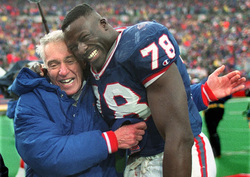
In Marv Levy's Buffalo Bills - The Best Second-Best Team in NFL History we look at just what an achievement it was to reach four consecutive Super Bowls and where Levy's Super Bowl teams belong in NFL history, despite them not winning any of the big game appearances.
CLICK HERE
CLICK HERE
SUPER BOWL XXIII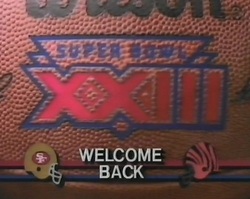
In this On The Sideline featured article we take a look at Super Bowl XXIII. Not only the most exciting Super Bowl of the 1980s but the first true classic game that UK viewers saw unfold live on their screens. It was also Bill Walsh's last game as 49ers head coach as well as the rebirth of the legendary Joe Montana. CLICK HERE |
CAPTAIN COMEBACK HARBAUGH AND THE 1995 CARDIAC COLTS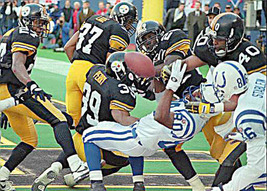
In Captain Comeback Harbaugh, The Cardiac Colts And The Lost Miracle Of The 1995 AFC Championship Game we look at the 1995 Indianapolis Colts - a team led by Jim Harbaugh who developed a habit of bringing his team from behind and almost took them to the Super Bowl, coming up one caught hail-mary shy in the AFC Championship game. CLICK HERE |
